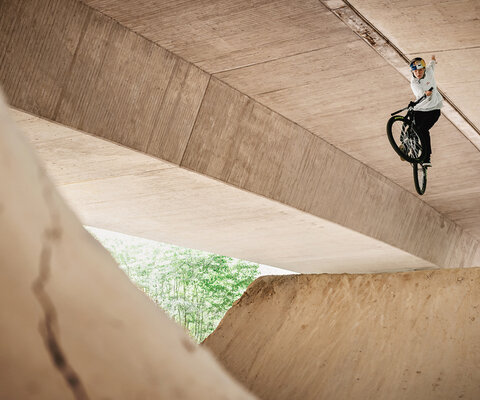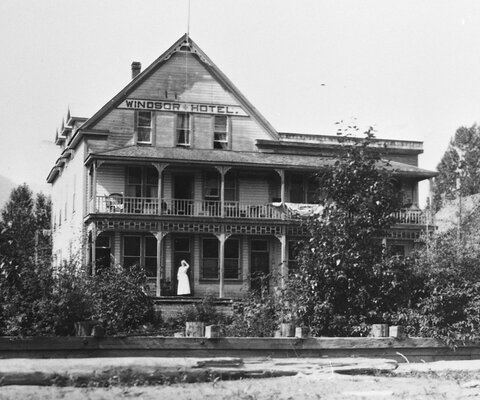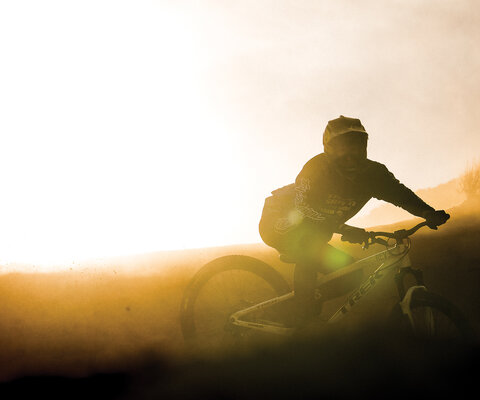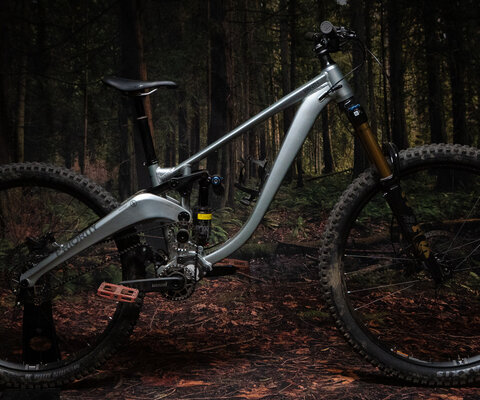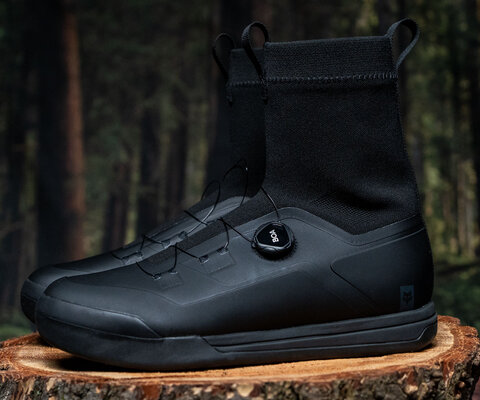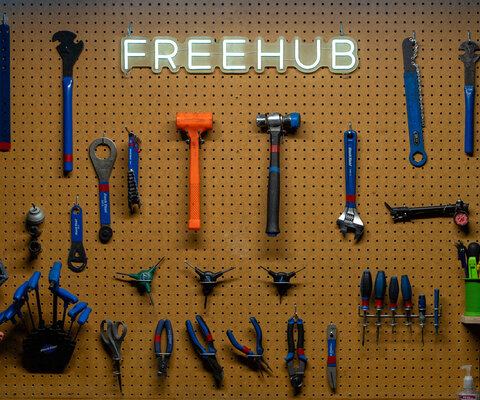
Club Dirt Grimy and Grand Mingle in a Small Idaho Community
Words by Sakeus Bankson | Photos by Chris Wellhausen
The wound on my elbow was only a scrape, but the blood and dirt smeared across the white porcelain sink and cotton hand towels looked as if some-one had been murdered in the otherwise spotless clubhouse bathroom.
Surely, a stinky, dust-covered mountain biker like me did not belong in such upscale facilities. So, when a polo-and-khakis-clad gentleman walked in, I knew I was about to get reported to management.
Instead, he just winced and asked on which trail I’d fallen, before recommending a post-crash beer at the restaurant to take the edge off. I cleaned up the sink as best I could, made a karmic apology to the janitorial staff and headed to the clubhouse bar, only to be confronted by a jarring mix of tucked-in polo shirts, smelly kneepads, crisp golf shoes, and scuffed helmets. At Jug Mountain Ranch, the contrast is oddly fitting.
At first glance, “Jug” seems an unlikely pairing: Located 100 miles north of Boise, Idaho, and 10 miles south of the resort town of McCall, the private residential community’s 1,410 acres includes an 18 hole championship golf course, posh luxury homes, an elegant clubhouse and restaurant, as well as 20 miles of top-tier, shuttle-accessible singletrack, all free to the public.
It’s a contradiction Jug wears surprisingly well. So much so, in fact, that in an area famed for its outdoor pursuits, the small golf club has become a cornerstone of McCall’s notably deep bike community. Nestled on the south shore of Payette Lake and the western edge of the Salmon River Mountains, the 3,700-person town has been a haven for mountain bikers since locals started exploring the surrounding backcountry trails in the 1990s. Today, hundreds of miles of singletrack wind through the valley. And, at the center, sits Jug Mountain.
“It’s the local’s place for an after-work ride—go out and get an hour, hour-and-a-half, two-hour pedal in,” says Joe Weede, Jug’s outdoor recreation director. “It’s great for families—kids get to play in our skills park and the parents will take turns riding all day.”
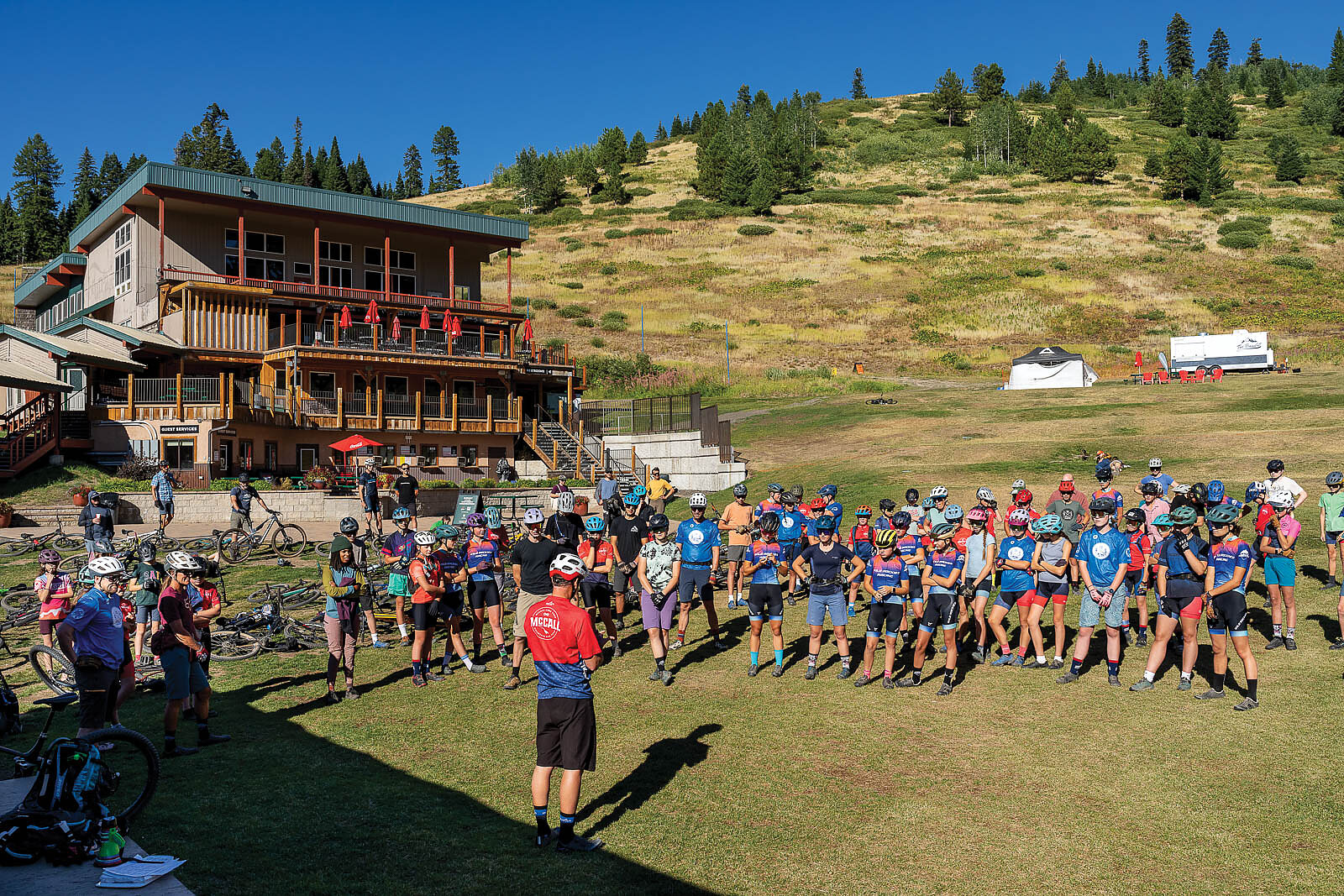
I met Weede in Jug’s parking lot early that morning, after making the 20-ish-minute drive south from McCall. The road turns left at the hamlet of Lake Fork, striking east toward the foothills of 8,310-foot-tall Jughandle Mountain as it winds between meticulously trimmed fairways, a driving range, and a few clusters of large homes before curling into a ponderosa forest. A line of shiny golf carts sat outside the clubhouse, ready for the day’s first golfers; our vehicle, however, was a dusty UNIMOG at the other side of the lot, where Weede waited to load our bikes for the first shuttle to the top.
Weede and mountain bike manager Heather Thiry (the two are also married) have been building and maintaining Jug’s trails for over a decade, helping owner David Carey turn the golf course into a mountain bike destination. Surprisingly, however, Carey isn’t much of a golfer—that side of the operation was kicked off by his father, who bought the Ranch’s first 500 acres back in 1980. Carey and his wife Ruth have been running the Ranch full-time since 2004, and though the golf course and houses are the most visible features of the property, more than 1,000 acres is preserved forest and open space complete with groomed, Nordic ski trails.
Carey does, however, mountain bike, so when Patrick Harper, Jug’s former Nordic director, suggested they use the winter ski trails for summer singletrack, it was an easy sell.
“He wanted something to entertain himself,” says Weede, “So he started adding some bike trails and it snowballed from there.”
By 2010, Jug had enough trails to host cross-country mountain bike events and was becoming one of the most popular riding zones in the valley. Rather than shut it down, Carey decided to make it official—a boon for the community, as well as a draw for potential homeowners. So, in early 2013 he brought on Thiry to help with the operational side of the program.
The Boise native is a competitive mountain bike racer, firefighter paramedic, ski patroller, backcountry ski guide, and a certified coach. She’s also worked around the country as a professional trailbuilder, including at Tamarack Resort’s bike park.
“There were no signs,” Thiry says. “When you’re actually out there, if feels a lot bigger than when you’re looking at the map. People would get lost all the time, ride off the property and get lost on state land … David asked me to come on to solidify that portion of the program so we could move on to building more trails.”
Later that year, Thiry brought on Weede fulltime. The duo set out to make the most of Jug’s 640 vertical feet, enlisting the talents of locals such as Jeremy McGlathery, the builder behind Double Shot and Stitches.
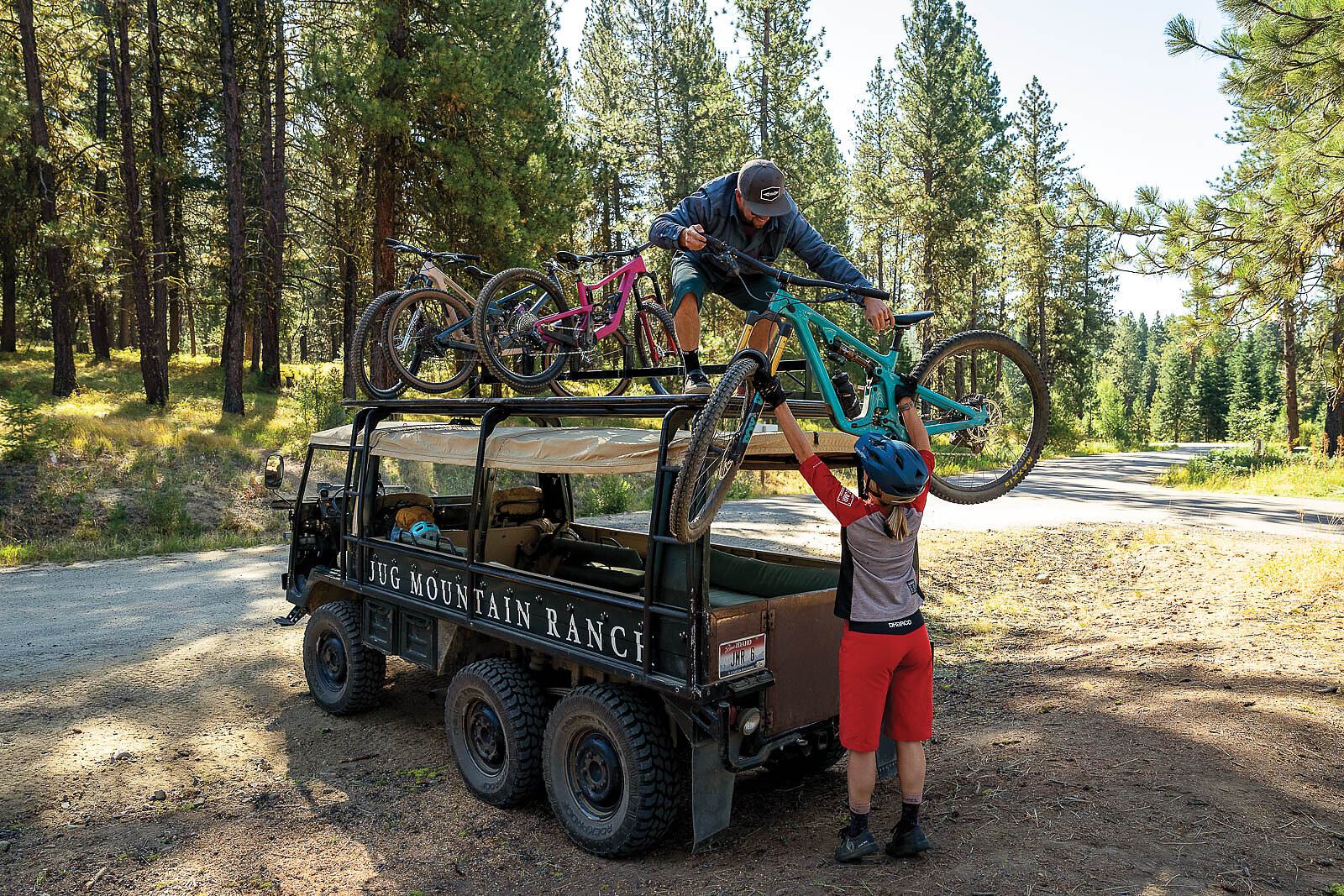
The result is a miniature bike park, all accessible for free via a dirt fire road or, for $30, by shuttle in the Ranch’s Pinzgauer or Humvee. There’s Doe Joe, a cruisy, beginner-friendly green trail, or Berm and Ernie, a high-speed rollercoaster of blue flow with mini rock gardens and endless berms. Oldies like Double Shot and Stitches still provide a hefty dose of drops, wood features and chunky granite, and the most recent addition, the double-black Exfoliator, has enough jumps and features to keep even the ambitious senders happy. Since the land is private, they can build whatever they feel the other local trail systems may be lacking.
“Progression was a big deal from the beginning and is still on our mind,” Thiry says. “Every year we sit down and try to prioritize— ‘OK, what are we missing in the valley?’”
To get the full experience, however, one must just visit Jug on a Wednesday evening during the summer. That’s practice night for the McCall Area Composite Mountain Bike Team, and with some 80 student athletes and 30 volunteer coaches, they go hard.
“It’s crazy, dust everywhere,” Weede says. “A bunch of little rippers that you can’t keep up with, just zipping around and hucking all the big stuff.”
Managing this madness is Dean Cromwell, the team’s head coach and director. The program started in 2015, and over the past 10 years has grown from six athletes to its current 80, over half of which are young women—impressive, considering the entire school district has a total of 1,400 students. As one of 24 National Interscholastic Cycling Association teams in the state, they go head-to-head with the largest schools in Boise, but there’s more to being a mountain biker than winning, at least in McCall.
“We always do a trail maintenance day at Jug, usually in the spring or early summer to spruce up the trails,” Cromwell says. “It isn’t just about racing; it’s putting time into the trails. We want kids who give back to the community.”
Cromwell and his wife Amy are shining examples. In 2014, the couple founded the Payette River Bicycle Movement, a nonprofit dedicated to refurbishing and donating used bikes. To date, the organization has given away nearly 400 bikes and new helmets to local kids.
Many of these have gone to Donnelly Elementary School, located just 10 miles from Jug. Each year, Cromwell and other volunteer coaches bring the fifth graders to the Ranch for two days of skills work and riding as part of the school’s physical education curriculum.
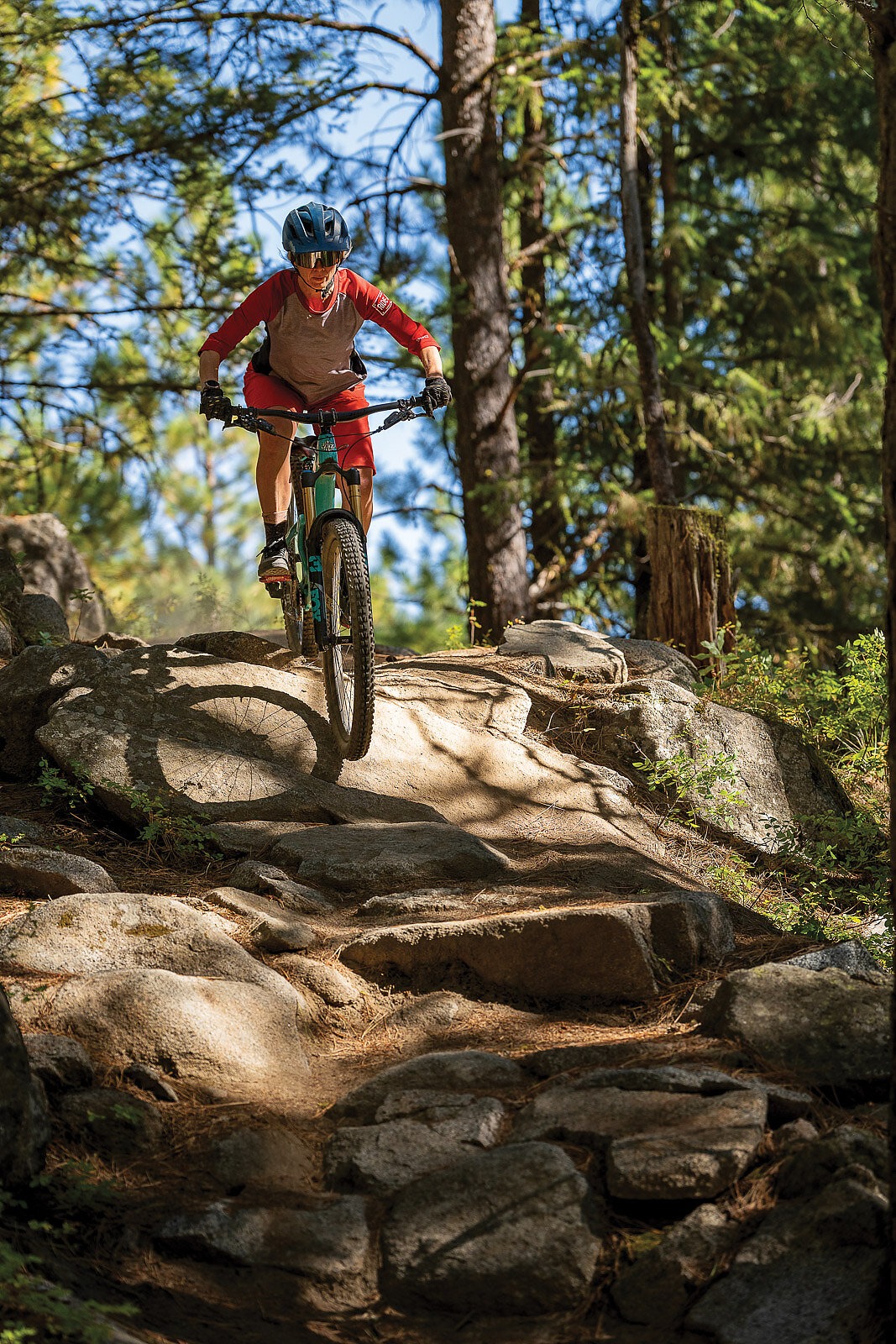
“Some of these kids have never been to Jug, which is really not that far from their school,” Cromwell says. “They’re out on the trails with all this enthusiasm, like, ‘I never knew this was there!’ Some have never ridden their bikes in the dirt, and some want to join the team after two days.”
There are no hungry high schoolers or excited fifth graders in the parking lot as we load up the UNIMOG for a final few evening laps. As the 4x4 vehicle growls up the rutted fire road, I ask Weede what’s next for the system. The plan is a raw, technical trail off the top to complement the park’s more flowy options.
“It’s a super small crew of dudes, so we really have to pick and choose,” he tells me.
We decide to end our day with a dose of Jug’s history and pulled off onto Double Shot, the park’s original freeride trail. Some of the features are from the original build, but most have been touched by dozens of other builders in the community, be that literal hands in the dirt or expertise and vision.
“A lot of people have been involved and helped create the place it is today,” Thiry says. “Some of the most-loved trails are Harper’s Hollow and other classics like that, which were put in long before Joe and I showed up.”
Fittingly, our ride finishes on Harper’s namesake trail, a winding cruise through huge ponderosas in the honey-thick evening light. Weede is waiting for us in the lot, and we dig through the cooler for evening beverages to complement the warm summer evening. It’s a scene that harkens back to some of the earliest days at the Ranch (and my blood-and-dirt-smeared scene in the clubhouse bathroom). Weede and Thiry had just gone all-in on the mountain bike program, and one of the golf pros was vocally skeptical about the trail system and how mountain bikers were “just going to drink beers in the parking lot.”
A few months later, that pro sent her a photo of the patio with more mountain bikers than golfers. Beer tastes just as good in golf shoes or bike cleats, it turns out, and Jug Mountain Ranch is the perfect place for both. “We still want the ‘hanging in the parking lot’ vibe, too,” Thiry says. “We don’t want that to go away.”
